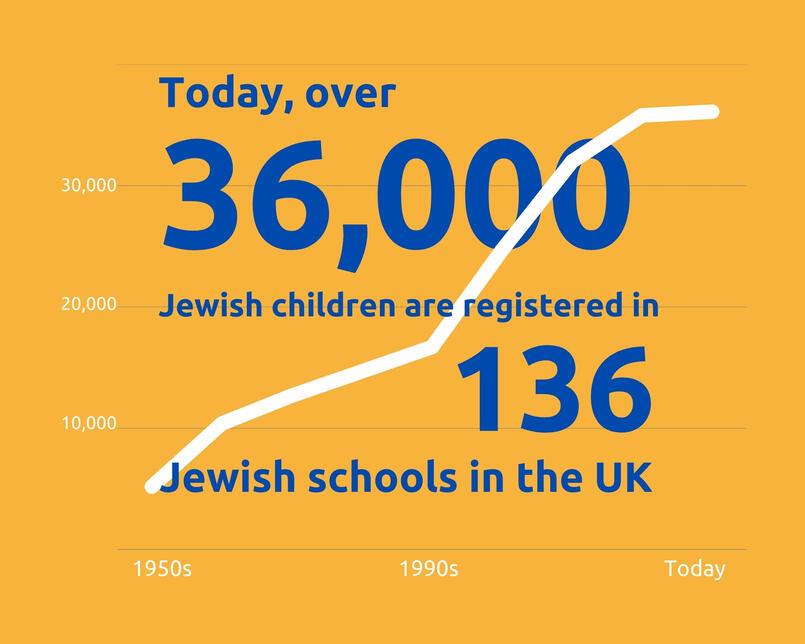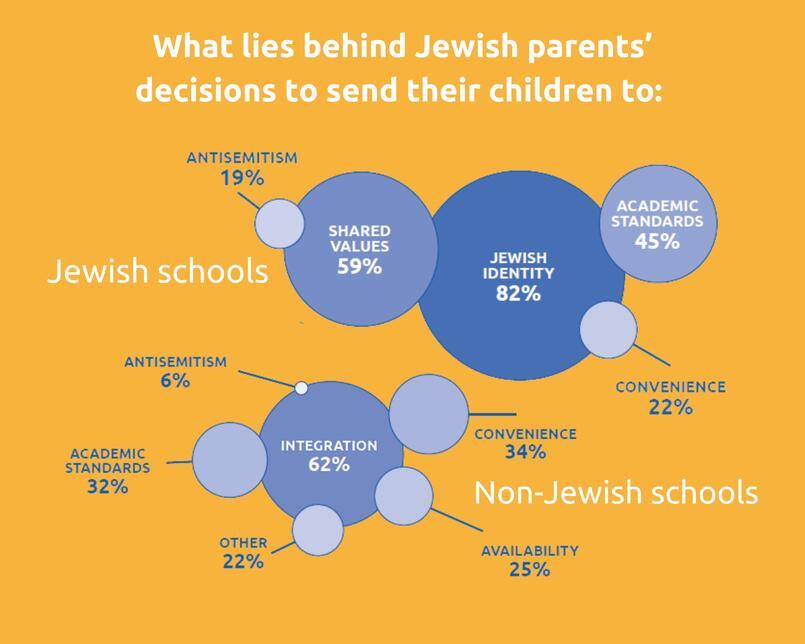Education is at the core of every Jewish community. Tracking trends and attitudes that affect Jewish schools is vital to ensure that there are enough school places, and can tell us a lot about Jewish community health
Omri Gal Kornblum
Omri Gal Kornblum
Education is at the core of every Jewish community. The decision to send their children to a Jewish school is one of the main ways Jewish parents choose to pass on their Jewish heritage to future generations. It’s also how many Jews meet their Jewish friends and build a sense of Jewish community that often extends long into adulthood. Ensuring that Jewish schools can meet the demand for places and instil a strong sense of Jewishness in their pupils is critical for parents, community leaders, and policymakers alike.
Tracking the number of Jewish pupils in Jewish schools plays an essential role in this work and serves more general demographic purposes. As such, it is a key component of JPR’s research programme, which also involves monitoring births and deaths, migration patterns, synagogue membership, and social and political attitudes. Together, these data help community organisations and charities determine what services to provide, in what quantities, and in which places. Here are five key facts from JPR’s latest statistical work on Jewish schools in the UK:
The number of British Jewish children attending Jewish schools has been rising steadily for decades, from just over 5,000 in the 1950s to over 16,000 in the mid-1990s, to over 36,000 pupils today. That sevenfold increase is even more striking given that the UK Jewish population declined in size by about 30% over the same period. Many attribute the increase in Jewish school numbers since the 1990s to the influence of Rabbi Lord Jonathan Sacks z”l, who, as Chief Rabbi of the United Hebrew Congregations of the Commonwealth, emphasised the importance of building Jewish schools to strengthen Jewish identity in Britain. Today, we estimate that nearly 70% of all Jewish school-age children in the UK attend Jewish schools. However, last year (between 2022/23 and 2023/24), official data showed the first numerical decrease since school enrolment data began to be collected annually in 1995/96.

The number of British Jewish children attending Jewish schools has been rising steadily for decades
In the mid-1990s, more Jewish children attended mainstream Jewish schools (55%) than Strictly Orthodox ones (45%). The opposite is true today: more Jewish children attend Strictly Orthodox schools (60%) than mainstream ones (40%). Indeed, this 60:40 split underestimates the scale of the shift that has occurred, as it does not take into account the significant number of Strictly Orthodox teenagers known to be studying in yeshivot and seminaries not included in the Department for Education data. While outside the Haredi community, the most recent estimates indicate that a minority of Jewish children (43%) attend Jewish schools, virtually all Haredi children in the UK are educated in a Jewish setting.
Most Haredi schools in the UK are private – 81% of Haredi pupils attend private Jewish schools. The mainstream Jewish school system is very different – of the Jewish children being educated within that sector, only 7% are in private Jewish schools. Private schools are often associated with privileged families who can afford high fees in return for small class sizes, excellent school facilities, and strong educational outcomes. However, Haredi Jews choosing private schools tend to differ significantly from those choosing private schools in broader society, as many Haredi families are markedly more disadvantaged and have more school-aged children. No new state Haredi school has opened anywhere in the UK since 2014, so increased demand has been met either by the growth of independent private Haredi schools or by more children falling outside the registered school system. As a result, recent legislation introducing VAT on private school fees will likely affect the Haredi community disproportionately.
Parents have different motives when choosing a school for their children. Those choosing Jewish schools are most likely to point to a desire for their children to develop strong Jewish identities and have friends with similar values as their main motives. Academic standards also feature highly for them. Those choosing a non-Jewish school most commonly mention actively preferring an integrated environment for their children as their main motive, although convenience, academic standards and availability are also important. Concerns about antisemitism have not featured as a significant factor in parents’ school choices in the UK, unlike in France, where this issue has been a significant driver behind those preferring Jewish schooling.

Parents have different motives when choosing a school for their children
Antisemitism can cause Jews to retreat into Jewish-only spaces, an issue that should be of concern to anyone who cares about building a more cohesive and understanding society. JPR research conducted in the summer of 2024 found that 23% of British Jewish parents with school-age children reported that their child or children had experienced antisemitism either at school (12%), in the vicinity of school (6%) and/or travelling to or from school (9%). Perhaps surprisingly, parents with children in Jewish schools were almost as likely as those with children in mainstream schools to say this. However, there are key differences. Parents of children in a Jewish school are more likely to report that they experienced antisemitism while travelling to or from school (13%) rather than at school (3%). In contrast, those with children in a mainstream school are more likely to report their children experienced antisemitism at school (21%) rather than travelling to/from it (2%). Reflecting on whether the October 7th attacks in Israel and the war in Gaza had affected their thinking about where to educate their children, 20% of those with children in a mainstream school said they would now be more likely to send their children to a Jewish school. This proportion doubles for parents whose children have experienced antisemitism while attending a mainstream school.
Director of Communications
Director of Communications
Omri holds a Master’s degree in Political Communication and a Bachelor’s degree in Journalism and International Relations, both from the Hebrew University of Jerusalem. He...
Read more